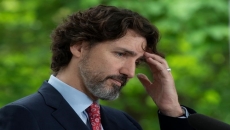Two major Canadian telecommunication giants said they will build out their next-generation 5G wireless networks with equipment from European providers, dumping China’s Huawei Technologies Co.
Montreal-based BCE Inc has said that Ericsson AB will chose the radio access network equipment -- the critical antennas and base stations -- for its 5G network. Telus Corporation. in a separate statement stated that it has decided to go with Ericsson and Nokia Oyj “to support building” its network, without elaborating.
Those announcements come ahead of a closely watched -- and long overdue -- decision by Prime Minister Justin Trudeau on whether to ban Huawei from taking part in the nation’s 5G infrastructure amid deeply troubled relations with Beijing.
Huawei previously played a large role in Canadian wireless networks but has faced growing national security concerns from Western governments. The Trump administration has lobbied allies to ban Huawei 5G, saying its equipment would make networks vulnerable to exploitation by the Chinese government.
Despite that, the U.K. said in January it would allow Huawei a limited role. In recent days, Prime Minister Boris Johnson’s government has backtracked, saying it seeks to reduce reliance on the company’s technology and on China. Telus and BCE awarded Huawei its first major project in North America in 2008 -- a pivotal contract that helped cement the Chinese provider’s reputation as a global player that could compete on quality.
The deal paved the way for it to become a major supplier to all three of Canada’s biggest telecom companies over the next decade. The Telus announcement comes as a particular surprise after Chief Financial Officer Doug French told the National Post in February that “we’re going to launch 5G with Huawei out of the gate” by the end of the year.






